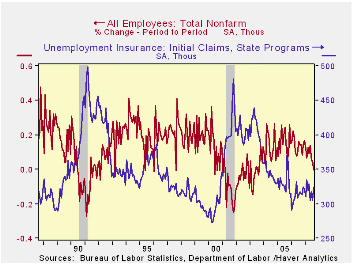 Global| Sep 10 2007
Global| Sep 10 2007Since When has Employment been a Leading Indicator?
by:Tom Moeller
|in:Economy in Brief
Summary
The decline in U.S. payrolls during August has raised the question of whether a recession in the overall economy is to come. In the past, sustained employment declines have been coincident with recession's onset, and sometimes they [...]

The decline in U.S. payrolls during August has raised the question of whether a recession in the overall economy is to come. In the past, sustained employment declines have been coincident with recession's onset, and sometimes they have lagged it. The question will become more relevant after the figures for September are released next month.
It is then that a bounce back in state employment will probably lift the numbers. State employment has declined a collective 74,000 during the last two months. This months' numbers will reflect the return of teenagers who left early for school.
As for the modest rise in private service sector jobs of 88,000, that's more problematic. Payrolls were unchanged in the financial industries following previously firm gains. Payrolls fell 4,200 in the transportation industries after modest growth earlier in the year. The 7,000 worker decline in information services looks real as it followed two months of decline in this industry where hiring is genuinely under pressure.
The 22,000 drop in construction employment is hardly problematic. Recent declines in that industry are likely to continue. The real question is whether they will spread.
What is true is that past declines in employment of one month, coupled with all these questions about its validity, have nearly always been followed by recovery; and often a sharp one. What is always true, however, is that employment declines are never sustained unless initial claims for unemployment insurance, a true leading indicator, rise. And so far that has not happened.
So we're left waiting.
Tom Moeller
AuthorMore in Author Profile »Prior to joining Haver Analytics in 2000, Mr. Moeller worked as the Economist at Chancellor Capital Management from 1985 to 1999. There, he developed comprehensive economic forecasts and interpreted economic data for equity and fixed income portfolio managers. Also at Chancellor, Mr. Moeller worked as an equity analyst and was responsible for researching and rating companies in the economically sensitive automobile and housing industries for investment in Chancellor’s equity portfolio. Prior to joining Chancellor, Mr. Moeller was an Economist at Citibank from 1979 to 1984. He also analyzed pricing behavior in the metals industry for the Council on Wage and Price Stability in Washington, D.C. In 1999, Mr. Moeller received the award for most accurate forecast from the Forecasters' Club of New York. From 1990 to 1992 he was President of the New York Association for Business Economists. Mr. Moeller earned an M.B.A. in Finance from Fordham University, where he graduated in 1987. He holds a Bachelor of Arts in Economics from George Washington University.
More Economy in Brief
 Global| Feb 05 2026
Global| Feb 05 2026Charts of the Week: Balanced Policy, Resilient Data and AI Narratives
by:Andrew Cates






